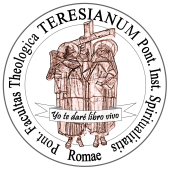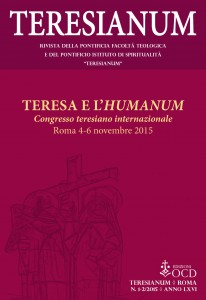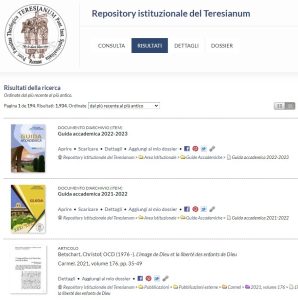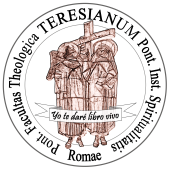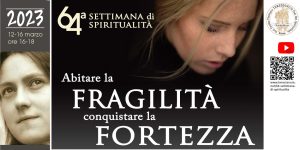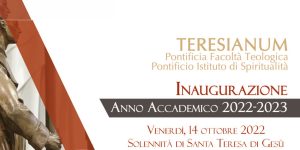Presentation of the different study offers
In a brief overview we present here the study and research paths offered by the Teresianum.
Programs in Italian
According to the Statutes of the Faculty, this first cycle of theological studies – aimed at obtaining in a three-year period the title of Baccalaureate in Theology – finds its justification in the task of offering a general introduction to the fundamental disciplines of Theology such as: Sacred Scripture, dogmatic theology, fundamental, moral and spiritual theology, canon law, practical theology, liturgy, Church history, patrology and archaeology, as well as biblical languages and the methodology of scientific research.
The achievement of the Baccalaureate degree allows students to enter various specializations, such as theological anthropology or spiritual theology at the Teresianum, or other specializations at other universities and colleges.
The specialization in Theological Anthropology aims to provide the student with the necessary tools to elaborate a unitary synthesis of two founding principles of classical anthropology, namely the principle of the imago Dei and that of man as a transcendent and open being. Through an accurate and contextualized study of this convergence, the student will be able to discern the various current problems inherent in the Christian view of the human being centered on the concept of person, equally endowed with essential qualities such as historicity, culture, religiosity and intersubjectivity.
At the Teresianum it is possible to obtain the degrees of Licentiate and Doctorate in Theological Anthropology.
Through the Pontifical Institute of Spirituality, it is possible at the Teresianum to access the cycle of specialization in Spiritual Theology. Spiritual Theology is understood as a theological discipline that studies the experience of Trinitarian life poured out by the Holy Spirit in the heart of the human person. This life has such an impact as to arouse in the human being a process of transformation that leads to living more and more of Christ and in Christ, an existence aimed at the achievement of revealed fullness. Therefore, spirituality contains a strong evangelizing aspect, a participation in the prophetic mission of the Church to be deepened.
The object of study of the discipline is spirituality understood as the Trinitarian life poured out by the Holy Spirit in the deep interiority of the human person. “Interiority” understood in the sense of the fundamental constitutive of the human being, where reached by the presence of the living God, so as to perceive a burning heart from which spring fruits of communion in ecclesial and social relationships.
At the Teresianum it is possible to obtain the degrees of Licentiate and Doctorate in Spiritual Theology.
The Course in Spiritual Theology intends to offer a basic formation in the field of Spiritual Theology in order to encourage a theoretical and practical deepening of one’s spiritual life. The course is designed for a wide audience – lay people, priests and consecrated persons – who wish to deepen their spiritual life in the Christian context, according to the experience of the Saints. To access the course, no specific philosophical or theological training is required, but a high school diploma or other equivalent qualification.
The duration of the course is two years, at the end of which a Diploma in Spiritual Theology is issued, but not an academic title.
The Course in Spiritual Theology Online is the distance learning part of the Course in Spiritual Theology and therefore intends to offer a basic training in the field of Spiritual Theology in order to promote the theoretical and practical deepening of the spiritual life.
The training is offered online with the help of the Moodle platform, through which the teachers provide audio lessons, accompanied by materials of various kinds designed to facilitate the study and deepening.
The papers for the exams are delivered through the Moodle platform.
The course aims to stimulate the personal work of the student by providing him with the appropriate resources. The teacher intervenes at the time of the exam and to answer any questions.
Many people today desire to experience God and to progress on a spiritual journey. Unfortunately, they do not always find competent and helpful guides, while offers abound that, through pseudo-religious discourses, exploit the emotionality of the moment without structuring the person in his or her entirety or in his or her journey towards full realization.
The Course in Spiritual Accompaniment – drawing on the long Carmelite tradition not only of experiencing the mystery, but also of listening and spiritual accompaniment – wants to help pastoral agents first of all by offering the theological foundations of spiritual accompaniment, which refer essentially to the deepening of the Word of God as a source of discernment. The contribution of the formation offer intervenes in what precisely concerns the guidance of persons, proposing criteria for discernment and instruments of analysis with the contribution of the human sciences. Finally, it wants to propose a practical formation in spiritual accompaniment which, being a ministry of the Church, requires from those who exercise it the canonical mission obtained from the competent ecclesiastical authority.
With a predominantly theological anchorage and setting, the course will establish a permanent dialogue with the human sciences that help to better understand the dynamics of the human person integrally involved in the varied itineraries of life, under the guidance of the Holy Spirit, that is, the spiritual man.
The Course for Trainers and Leaders of Communities of Consecrated Life and Societies of Apostolic Life is part of the Carmelite tradition or school of spiritual accompaniment and pastoral spirituality. Through this course, the experience of the Carmelite mystics and their teaching find a concrete way for the formation of formators and community leaders who have the task of accompanying young people and the people entrusted to them through the theological journey to the goal of mysticism: union with God.
The living tradition of the Church has given rise to various families and religious Orders who live the sequela Christi in different colors and ways. In the panorama of Pontifical Institutions in Rome, there are Universities, Athenaeums and Faculties that offer courses in spiritual theology in the perspective highlighted by different spiritual traditions to which they are related. Students choose places of study a reason for their religious affiliation or affinities spiritual, but often have a desire to know as well other forms of spirituality and to take advantage of a horizon more complete knowledge, both to better bring out the peculiarities of one’s own spirituality in comparison to others, and again to be able to help other people with an affinity different, in spiritual accompaniment. Training it is aimed above all at the students of the licentiate pathways in spiritual theology, but can also be chosen as spiritual deepening by students of other disciplines.
Programs in English
The Online Course in Spiritual Theology (100% at distance) intends to offer a basic training in the field of Spiritual Theology in order to promote the theoretical and practical deepening of the spiritual life.
The training is offered online with the help of the Moodle platform, through which the teachers provide lessons (on Zoom in real-time or pre-registered), accompanied by materials of various kinds designed to facilitate the study and deepening.
The course aims to stimulate the personal work of the student by providing him with the appropriate resources. The teacher intervenes at the time of the exam and to answer any questions.
PS: A similar online course exists in Italian.
For priests, seminarians, religious and laypeople who are studying in the Roman Pontifical Universities and Faculties in different mainly philosophical and theological programmes, as well as for other religious and laypeople, our Pontifical Faculty of Theology offers a two-year programme in Spiritual Theology and Carmelite Spirituality (30 ECTS). We consider it to be an existential and theological complement for those who desire to delve into the spiritual riches of Christian and Carmelite spirituality, so as to nourish and enhance their spiritual life in Christ. The second closely related goal is to provide an intellectually rigorous and thorough formation in Spiritual Theology and Carmelite spirituality, helping students to acquire a scientific method of learning and researching.
